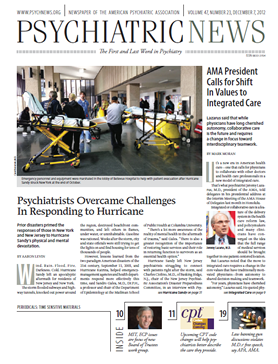During the closing months of our third year of residency, we spent considerable time preparing for the July 1 transition. Each of us had a caseload of approximately 70 patients whom we managed. Ensuring that medication refills, transfer notes, treatment plans, and follow-up appointments were in place, the process was logistically challenging and emotionally draining.
Perhaps what most bothered us was the unspoken knowledge that while this transition system served our training needs, the effect on our most vulnerable patients could be, in spite of our efforts, deleterious to their well-being.
Ms. A, for example, was a refugee with schizophrenia who stopped her medications for six months when her last provider left the clinic. She and her family did not understand the concept of refills, and she decompensated markedly to the point of being uncommunicative, withdrawn from family members, and unable to fulfill basic tasks of daily living.
Thousands of patients across the country receiving care in clinics staffed by third-year resident psychiatrists must cope with the reality of having to transition to a new clinician each year. This transition can impact clinical outcome and the therapeutic relationship in myriad ways.
The transition almost always involves switching from a more-experienced clinician to a less-experienced one, a dynamic that can cause anxiety in the patient and clinician alike. Many of the patients whom residents care for are among the most disenfranchised of the psychiatric population and in need of the most support. Many of these vulnerable individuals have a history of trauma and/or an attachment disorder that dominates their emotional lives. These clinician transitions—which, in the authors’ experience, often take place just as the therapeutic alliance begins to deepen—can undermine treatment and even create iatrogenic harm and distress.
We invited our patients to openly discuss their thoughts, feelings, and emotions about the termination process. We found that offering quiet, compassionate, and involved listening was crucial. Involving the entire treatment team, including loved ones, medical providers, therapists, and case managers, helped facilitate efficacious care and a smoother transition.
Specifically, we held joint sessions with the current and new clinicians to help allay patients’ fears and to ease the transfer in care. We made every effort to ensure that patients receiving care from multiple clinicians could maintain a therapeutic relationship with at least one of them during the transition process. Additionally, we found it important to foster a sense of positive institutional transference in our patients by reminding them that all of the clinicians and ancillary staff value a team approach to mental health care.
Residents can benefit from exploring their personal feelings about termination and anticipating patients’ responses to termination, which will vary depending on individual attachment styles, psychopathology, and life experiences. Patients can often sense the clinician’s feelings and may react to the clinician’s conflicts, which can further complicate the challenges of termination and the transition to a new treating psychiatrist.
Feelings of abandonment may lead our patients to act out in a range of ways from unconscious and subtle to overtly conscious and provocative. These behaviors challenged us to develop ways of expressing empathy while being mindful of consistent boundary and limit setting. Supervision, process groups, and personal therapy helped us to deal effectively with our own emotions such as fear, insecurity, anger, guilt, and hopelessness when patients behaved in emotionally charged ways.
Supervision taught us to be more attuned to emerging enactments that can have significant transformative potential for both the patient and clinician. An enactment can be described as a subtle and often unconscious interplay being played out in the therapeutic relationship, and it often is co-created by both patient and clinician, reflecting unconscious conflicts, needs, and dissociated experiences.
Recognizing, exploring, and understanding when an enactment is occurring in the therapeutic space can have long-lasting therapeutic effects and promote growth in the patient if worked through. Enactments concerning termination are often plentiful, given the psychological baggage that both patients and clinicians carry regarding issues of loss and separation.
For Ms. A, preparation for the annual transition began at the onset of treatment. Her care focused on engaging her through monthly appointments that included family participation. A simple, streamlined medication regimen was deliberately developed. Ms. A’s interpreter remained involved in all aspects of care and agreed to arrange her first appointment in early July to ensure that she remained connected to the clinic.

Michael Ascher, M.D., is a PGY-4 resident at Beth Israel Medical Center in New York. Rupinder Legha, M.D., is a PGY-4 resident at the University of Colorado. Both authors are Ginsburg Fellows in the Group for the Advancement of Psychiatry.

